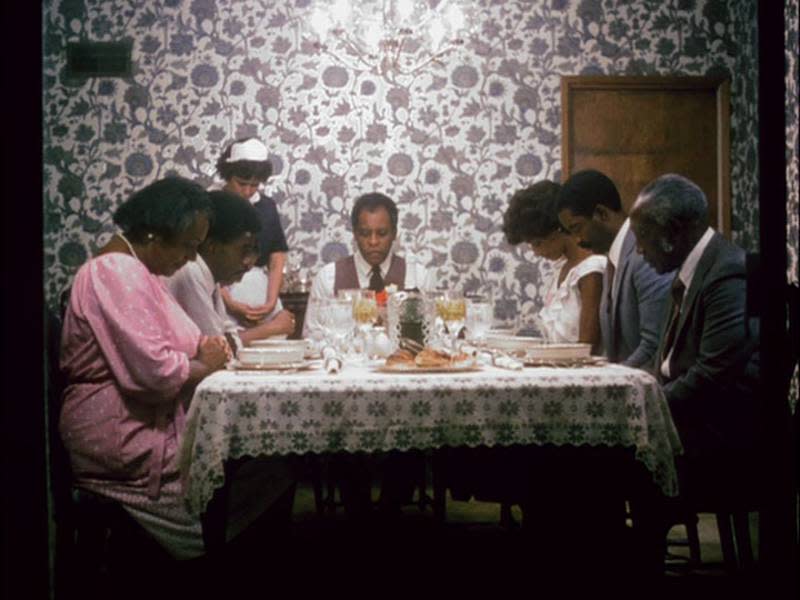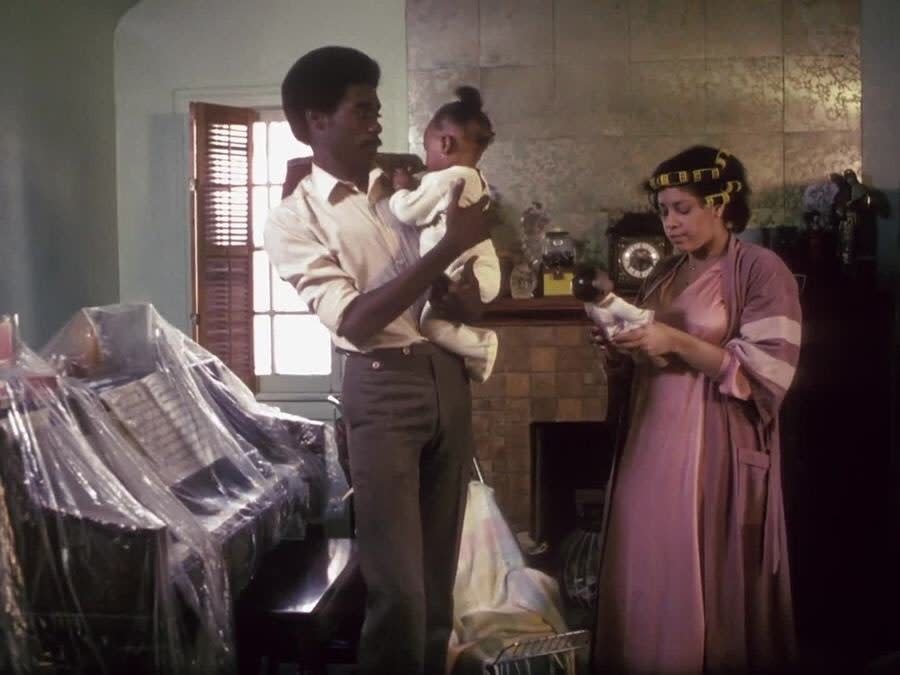‘My Brother’s Wedding’ Filmmaker Charles Burnett Reflects on the Painful, Protracted Journey of His Nearly-Lost Masterpiece
- Oops!Something went wrong.Please try again later.
- Oops!Something went wrong.Please try again later.


Charles Burnett is best known for his landmark portraits of Black American life, from the aching neorealism of “Killer of Sheep” to the mordant mysticism of “To Sleep with Anger,” his films aim to depict the broken contract the country made with its African American citizens in the aftermath of World War II.
His lesser-known masterpiece “My Brother’s Wedding,” however, is emblematic of a different continuum running through Burnett’s films: the theme of becoming.
More from IndieWire
An intimate window into early ’80s Los Angeles, where confluences of Black Southern roots were still trying to flower in a hostile urban environment — “My Brother’s Wedding” is a heated tale about the perils of upward mobility, the rising drug epidemic, and the tight alliance shared by two Black men, Pierce (Everett Silas) and Soldier (Ronnie Bell), the latter of whom has just been released from prison as the film begins.
Young and proudly working-class, Pierce is agitated by the romantic union that will elevate his brother Wendell (Monte Easter) to the upper social status of Wendell’s affluent fiancé, Sonia (Gaye Shannon-Burnett). Pierce treats Sonia with disdain, even as he protects the troubled Soldier, an imbalance that’s put to the test when he’s forced to choose between appearing at Wendell’s wedding or attending a funeral of a friend. It’s a choice that ignites an internal tug-of-war within him.
“My Brother’s Wedding” found abbreviated life when it premiered at New York City’s New Directors/New Films festival in 1983, but that version of the film that first screened was tainted after producers snatched the edit away from Burnett to disastrous results. The rough-cut wasn’t well received by festival audiences (and infamously earned a harsh review from The New York Times), causing those same producers to then shelve the picture until Milestone Films co-founders Dennis Doros and Amy Heller bought the rights several decades later, allowing Burnett to finally finish editing in 2007.
While the 2007 version is much closer to Burnett’s original intent, it’s difficult for the filmmaker to forget what could have been. “I thought that if it was cut right, then we could’ve had a story that really spoke to what was going on in the community,” he told IndieWire in a recent interview.
Raised in Los Angeles, Burnett emerged from a modest working-class background to attend UCLA film school, where he met Larry Clark, Julie Dash, Haile Gerima, and Billy Woodberry, and formed what would become known as the LA Rebellion: a group of Black creatives dedicated to humanizing the lives of Black people on screen.

Burnett’s master’s thesis, “Killer of Sheep,” took that charge to heart. A groundbreaking black-and-white scorcher filmed in the aftermath of the Watts Uprising, the film told the story of a Black family living on the economic margins to the point of emotional rot (Kaycee Moore’s performance as the yearning mother remains a particularly towering acting achievement). Due to music rights issues stemming from the film’s soulful soundtrack, however, “Killer of Sheep” also wouldn’t be released wide until 2007 (another save by Milestone Films).
“My Brother’s Wedding,” therefore, had offered Burnett an exceedingly rare chance for a Black filmmaker: a second feature. As in “Killer of Sheep” before it, Burnett cast first-time actors — fixtures in the South Central neighborhood he called home — and relied on the bluesy, soul songs of Johnny Ace to add further sonic textures. Rather than shooting in black and white again, however, he opted for color. He also wanted a comedic element he felt was lacking in his previous film.
“‘Killer of Sheep’ got some good reviews, but people looked at it and said it was too dry, and so forth,” Burnett said. “‘My Brother’s Wedding’ was a number of things: It was an attempt to sort of correct the lack of humor, but, you know, make it more satirical yet serious by making fun of some of the things from when we were kids growing up, along with middle class conflicts and things like that.”
That desire to reach for a spirited, kinetic tone also shifted “My Brother’s Wedding” away from capturing the strain of a striving Black mother and father (“Killer of Sheep”) to a younger generation, closer to Burnett’s own, who found themselves disillusioned in a different way by economic lack.
In fact, the script took inspiration from a real-life event where Burnett promised one friend he’d attend her wedding, only to discover that it fell on the same day as another buddy’s funeral. “I was gonna tell her I can’t go [to the wedding]. I was walking up to her to tell her, but I was too chicken to say I can’t go. So I tried to do both,” he said. “I went to the wedding and it took forever to start. There were all these announcements, an uncle, a cousin, whatever, their plane was late. So finally, the wedding took place and I tried to get to the funeral and by the time I got there, it was all over.”
Burnett molded his painful experience to explicate the let downs and hardships encountered by the Black folks who migrated from the South to South Central, Los Angeles. Originally born in Vicksburg, Mississippi, Burnett recalled how African Americans found racism on the West Coast as prodigious as the kind they left behind: Neighborhoods like Inglewood, West Los Angeles, Pasadena, Glendale, and Beverly Hills mirrored the rhythms of sundown towns, where Black folks could go to work during the day but had to leave before nightfall. And yet, the weight of prejudice didn’t force Black people back below the Mason-Dixon line.
“I grew up in an oral traditional kind of situation where a lot of Southerners were here, and they would talk about the South and what they experienced. Lyrically and metaphorically, there was always the South as this sort of mythical place that exists where they all had these awful experiences of racism and fear, and they didn’t wanna go back,” Burnett said. “My mother said she’d never go back there. That was her freedom.”

That freedom in “My Brother’s Wedding,” however, isn’t felt by Pierce: While he doesn’t want to transition into a wealthier pretentious class, he feels trapped in the menial job he performs clerking his parents’ ramshackle dry cleaners. Burnett uses the dry cleaners as a meeting place between age groups: There’s the tween Black girl infatuated by Pierce (he ignores her romantic pining), an elderly man arriving to have his trousers repaired, and the young adults grabbing their chic outfits. The routine leaves Pierce trapped in an endless malaise that’s only interrupted by Soldier’s release from jail. Pierce promises Soldier’s mother that he’ll keep her son out of trouble, but with few job opportunities for Soldier, no educational prospects, and a mess of emotional issues, Pierce’s word means little. Soldier falls back into bad habits, and even worse behavior.
Though Pierce’s disdain for Wendell and Sonia defines the complex film’s drama, looking back on the script, Burnett wishes he had opted for an even-handed approach. He recalls how he yearned for the ability to make long-term plans the same way children of wealthier Blacks did.
“Because their parents were doctors, lawyers, and professional people, they instilled that in their sons and daughters,” he said. “When we were growing up here, kids from Mississippi, South Arkansas, whatever, we didn’t want the same jobs as their parents. We didn’t want to do housework or carpentry. We didn’t have to go to school for that. We did home training.” In that regard, it’s telling how Pierce rejects the pleas from his parents to settle down and instead carouses with Soldier amid South Central’s bustling nightlife.
Tenuous scenes of tradition and angst power the textured mosaic adorning “My Brother’s Wedding.” Burnett captures how the Black Southern church-going transplanted to the West Coast — Pierce’s mother attends sermons and Pierce reads Bible verses to the neighborhood’s elders, Big Momma and Big Daddy — and the vibrant Southern-inspired bars and clubs that popped up too. The younger and older characters might butt heads, but there’s also a deep ancestral love. Tender wrestling scenes between Pierce and his dad, and the tight hug Soldier receives from his own father, pay tribute to the sage people Burnett grew up with.
That’s because “My Brother’s Wedding” offers a depiction of Black life that isn’t limited to the tragic. Instead, it’s a fully realized picture of Black people’s three-dimensional reality propelled by an empathetic lens and adept performances, Ronnie Bell’s turn as Soldier chief among them.
In Burnett’s eyes, Bell is reflective of the lost potentiality of Black talent. It’s a plight not only seen in a character like Soldier, but also present in the actor’s unrealized career. Hailing from Sacramento, Bell is the son of Aaron Mitchell, the lone person executed in California under Ronald Reagan’s governorship. Bell portrayed his own father in a production put on by the Inglewood Theater; Burnett attended the performance and cast Bell soon thereafter.
Bell’s moving, empathetic turn as the rugged Soldier should have netted the talented actor further roles. Like many other skilled Black actors, Bell ultimately quit the profession when his career stalled out (later in life Bell advocated for abolishing the death penalty).

“He was like Kaycee Moore,” the director said. “They had that energy. I swear to God, they should have collected those people and made ’em stars and made ’em movies because they had more energy and more presence than most actors. It was like having Louis Armstrong and not giving him a trumpet.”
By the time Burnett arrived at “To Sleep with Anger,” he was startled at how often the older Black actors who read for parts were brilliant talents who had yet to have gotten their breaks. “You always come back saying ‘how come I didn’t see you in more of this or that and this?’ You ask the question but you know the answer to your own question. That’s what racism will do,” he said.
“Killer of Sheep” languishing in legal limbo for over three decades didn’t help, nor did “My Brother’s Wedding” being shelved for nearly twenty-five years. Similar to many Black actors, the Black directors of the ’80s and ’90s also witnessed the erasure and eventual rediscovery of their best work.
Kathleen Collins’ “Losing Ground,” Ayoka Chenzira’s “Alma’s Rainbow,” Cauleen Smith’s “Drylongso,” and Wendell B. Harris Jr.’s “Chameleon Street,” are just some of the Black films that have been “rediscovered” in the last decade. How much richer could Black cinema be if earlier success by talented filmmakers had been followed by firm encouragement?
All of Burnett’s films bristle with that sense of becoming, even as dashed guarantees stifled worthy Black creatives to the margins. It’s cruelly ironic, then, that “My Brother’s Wedding” became emblematic of a persistent “what if” when producers took away the filmmaker’s final cut. Even when Milestone Films granted Burnett a second chance to finish editing, the ghosts of the previous butchery forced the director’s original vision just out of reach.
“Because when you edit a film, you have all of the materials that you shot, including the outtakes. The outtakes for ‘My Brother’s Wedding’ had disappeared,” Burnett explained. “So it wasn’t so much an edit as it was a trim.” While grateful to Milestone Films, Burnett still thinks about the film’s unexplored ideas that will remain forever unrealized. “I never looked at the film after that as an accomplishment,” he added. “I think the story, to me, is a good story, but it wasn’t executed well because of the problems with the edit and all of the errors that happened while trying to get it completed.”
Since its release in 2007, the film has been lauded by many. The critic Richard Brody wrote that “Burnett fills the film with voices and memories, humor and rage; his vision of neighborhood life has an ample, passionate generosity.” Reached for comment for this article, Black Film Archive founder Maya Cade said “‘My Brother’s Wedding exhibits wisdom, poise, and poetry of Black life that feels almost like a dream. Burnett’s gift of craft displayed here became the beacon that awakened a new generation of Black filmgoers and filmmakers.”
In a twist of fate, the same anger “My Brother’s Wedding” was meant to voice — the feeling of being pushed around, the erasure of an entire generation’s hopes — is literally tied to the making of the film. It now stands as not just a specific recollection of ’80s Los Angeles, but as a compassionate, humanist opposition to the limiting hood films that would follow in the the rest of the decade.
It also provides a touchstone to the themes of Black southern heritage and the tension of younger generations colliding with the traditions of their mothers and fathers that would inspire “To Sleep with Anger.” “My Brother’s Wedding” is the imperative thread providing the through-line to the director’s career, and a resonant metaphor for the Black experience in post-war America.
It is one of Burnett’s masterpieces, not only because of its compromised nature, but also because of it.
Best of IndieWire
Where to Watch This Week's New Movies, from 'Blue Beetle' to 'The Adults'
The 50 Best Sexy Movies of the 21st Century, from 'Spring Breakers' to 'X'
Sign up for Indiewire's Newsletter. For the latest news, follow us on Facebook, Twitter, and Instagram.

